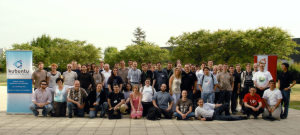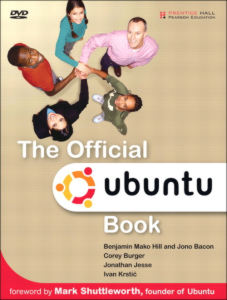
Ubunteros squash those bugs
Most of the software contained in K/Ubuntu started life in other projects. We call these original projects “Upstream projects”, because of the similarity to a river starting off in the mountains “upstream” and flowing downwards, gaining momentum as the water spreads out to the distributions, of which Ubuntu is one.
Simon Law is Ubuntu's Quality Controller and champion of the Ubuntu bug-tracking system called Malone. Simon has just sent us news of the upcoming Hug Day:
Once again, I'm pleased to announce the Ubuntu Hug Day.
The BugSquad is always looking for new volunteers and we'd love it if you joined us. We'll be meeting in the #ubuntu-bugs IRC channel on irc.freenode.net. When, you ask? All of Wednesday [2006-09-13], whereever you are. Just hop on and introduce yourself.
We'll be concentrating on forwarding bugs from our bug-tracker, Malone, to any upstream projects. This helps everyone by providing good, researched bug reports for upstream projects to look at. And then the new code lands in Ubuntu.
After new bug reports come in, a step called triaging takes places. Triaging is the process of gauging the severity of a bug, then ensuring that the issue is passed on to the correct contacts. Often the “correct contacts” are the original programmers, who may not themselves be associated directly with Ubuntu.
The upstream triaging process consists of passing confirmed bug reports to the original project and is called “Upstreaming”. Upstreaming a bug consists of searching the bugtracker of original project, hunting to see if a matching issue has already been reported as a bug. If a matching report is found, for instance in the Mozilla or GNOME bugzilla, then all the details from the Launchpad/Ubuntu bug page are forwarded.
Forwarding bug data requires ensuring that the most vital details are transferred correctly and removing any superfluous information that may confuse the situation. Careful use of cut-and-paste is required, combined with a small amount editing.
Passing on bug reports to upstreams helps everyone, not just Ubuntu users. A bug fixed by a original project will propagate to all users of that program, be they using Debian, Gentoo, Fedora, Suse or Mandriva. Sometimes, in the process of forwarding a bug, an Ubuntero may find that the upstream authors are on the case and already have a fix for the bug with a new version! When a bug is fixed directly by “upstream, the Ubuntu developers gain by being able to focus on making Ubuntu better—on making the sum-of-parts work better, so to speak.
We urge you to join this effort to improve the quality of the packages included in Ubuntu. Doing so helps to make the world a better place, albeit in a very small way. You will be rewarded for your efforts with a warm, friendly hug every time you close a bug and of course a magical boost to your Launchpad karma rating! As Simon says, we “Hope to see you there!”.



